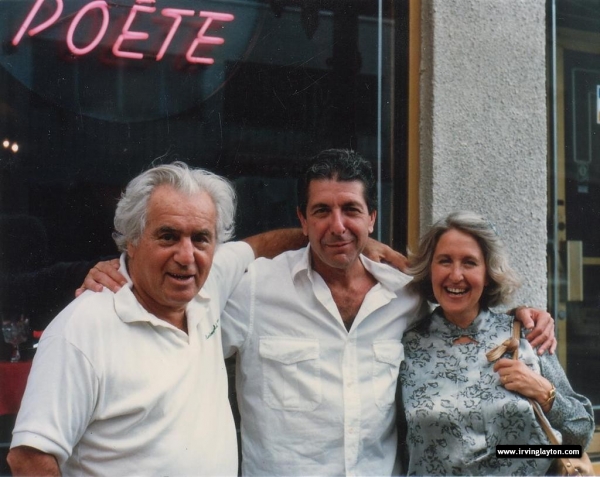Leonard Cohen - Residence
1934 - 1938
4028 Vendome
Leonard Cohen, author, poet, and musician, was born on September 21, 1934 to a prosperous Jewish family in Westmount. His grandfather, Lyon Cohen, was the owner of the successful men’s clothing manufacturing firm, the Freedman Company, and was perhaps the Jewish community’s foremost leader during the early decades of the twentieth century. Leonard’s father, Nathan Cohen, died when Cohen was just nine years old, leaving him under the care of his Russian-born mother, Masha, as the family became more dependent on the support of his father’s brothers. Cohen attended Roslyn School and then Westmount High School, while also going to Hebrew school and becoming a bar mitzvah at the Shaar Hashomayim synagogue, where his family was actively involved. It was during his adolescence that he turned more and more to writing and learned to play guitar. This more introverted, artistic side of Cohen in some ways contrasted with the student who played sports and was a leader in extracurricular activities.
At McGill University, Cohen met the poet and English professor Louis Dudek, who helped publish Cohen’s first book of poetry, Let Us Compare Mythologies, in 1956, soon after Cohen’s graduation. During the 1950s, Cohen also encountered fellow poet Irving Layton, who also became a mentor. After graduating, Cohen continued to publish poetry, but also produced his first two novels, The Favourite Game (1963) and Beautiful Losers (1966), while living on the small Greek island of Hydra in the Aegean Sea. In 1967, Cohen relocated to the United States and began performing his own songs in the New York folk music scene. His debut album, Songs of Leonard Cohen, featuring songs such as “Suzanne” and “So Long, Marianne,” garnered him fame in both folk circles and with a wider audience. He continued to develop as a songwriter and performer, notably on the Phil Spector-produced Death of a Ladies’ Man (1977), which featured cameos from Bob Dylan and Allen Ginsberg. Various Positions (1984) featured some of Cohen’s most well known songs, including “Hallelujah” and “Dance Me to the End of Love.”
Cohen spent five years in the 1990s living in a secluded Buddhist retreat outside Los Angeles, returning to music in 2001 with Ten New Songs. In recent years he has continued to release albums and a new volume of poetry, Book of Longing (2006), and embarked in 2008 on a worldwide tour for the first time in fifteen years. His most recent album, Old Ideas, was released in early 2012.
Besides his main themes of love, loss, war, and art, Cohen has not shied away from drawing explicitly on his Jewish background for material, as in “Who by Fire,” with its lyrics adopted from a traditional Yom Kippur prayer. Despite his Buddhist practices, Cohen continues to consider himself an observant Jew. Recipient of innumerable lifetime achievement awards, an inductee to the Rock and Roll Hall of Fame, and a Companion of the Order of Canada, Cohen continues to maintain a residence in Montreal’s Plateau neighbourhood.
Compiled by Richard Kreitner.
Links
Liens
Leonard CohenLeonard Cohen’s Montreal
Sources
Cohen, Leonard. Beautiful Losers. New York: Viking, 1966.
Cohen, Leonard. Book of Longing. Toronto: McClelland & Stewart, 2006.
Cohen, Leonard. Let Us Compare Mythologies. Toronto: McClelland and Stewart, 1956.
Cohen, Leonard. The Favourite Game. London: Secker & Warburg, 1963.
Dorman, Loranne S. Leonard Cohen: Prophet of the Heart. New York: Omnibus Press, 1990.
Devlin, Jim. In Every Style of Passion: The Works of Leonard Cohen. New York: Omnibus Press, 1996.
Nadel, Ira Bruce. Various Positions: A Life of Leonard Cohen. Austin: University of Texas Press, 2007.
*Image is courtesy of Max Layton.


This project is funded in part by the Government of Canada.
Ce projet est financé en partie par le gouvernement du Canada.
Ce projet est financé en partie par le gouvernement du Canada.
This project is funded in part by the Government of Canada.
© 2011-2015 Museum of Jewish Montreal, All Rights Reserved.
Site by Air Code Design inc. ![]()
© 2011-2015 Musée du Montréal Juïf, Tous droits réservés. Site par Air Code Design inc. ![]()
